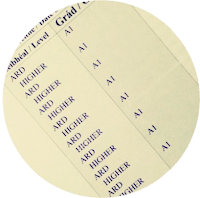Ten percent of the marks in Higher Level English are awarded for Accuracy of Mechanics, so here is our ever expanding, yet concise, set of high-yield grammar nuggets.
To have any chance at figuring out the dreaded commas, you need to be able to spot the main active noun (“the subject”) and the main action word (“the predicate”) in a sentence. That‘s what the highlighting is about.
It’s a great advantage not to drink among hard drinking people. (Fitzgerald)
I would love to help humanity on a Warner Brothers salary. (Miller)
Try it for the other two sentences…
It is the subject of the second sentence. Is a great advantage is the predicate.
I is the subject of the third sentence. Would love to help is the predicate.
Longer sentences often involve two sets of subjects and predicates.
As such they are two sentences in one.
Two sentences in one: if, because, while, as, although, since, unless, etc.
Use a comma if the sentence begins with one of these words.
Though this be madness, yet there is method in ‘t.
When we are born, we cry that we are come to this great stage of fools.
This kind of sentence consists of two, really.
The second part could exist on its own in theory.
However, the first part can’t.
You can’t just say “If I go to the shop”, but you can say “I’m getting a chocolate bar”.
In other words, the if part (or clause) is dependent: it can’t exist on its own.
Don’t use a comma if the dependent clause (the one with if, when, etc) is at the end of the sentence.
It is silliness to live when to live is torment, and then have we a prescription to die when death is our physician.
Two sentences in one: and, but, or
Always use a comma for such a sentence.
There is nothing either good or bad, but thinking makes it so.
[Here, to simplify things, thinking can be thought of a second subject]
I wasn’t actually in love, but I felt a sort of tender curiosity.
Ask no questions, and you’ll be told no lies.
You can drop “but” and replace is with a semicolon.
Reputation is an idle and most false imposition; oft got without merit, and lost without deserving.
If the independent clauses are more closely related, you can use a colon.
Nothing will come of nothing: speak again.
Don’t get fooled – watch for the two separate subjects and two separate actions.
What should a man do but be merry?
I stole her heart away and put ice in its place.
I understand a fury in your words but not your words.
Lists
I loved her against reason, against promise, against peace, against hope, against happiness, against all discouragement that could be
Set off non-essential information with a comma
How do you tell the whether it is essential or not? Remove it from the sentence. If the sentence retains its meaning, then the part you removed was non-essential.
Even Hamlet has more than two friends, so which two is so significant to the sentence that you can’t wall it off with a comma.
That
That is used to talk about essential information, so no comma is needed.
Which
Which is used to talk about non-essential information, so a it always needs a comma.
Introductions, interruptions, afterthoughts
All of these are non-essential elements, so they should be walled off with a comma.
In jest, there is truth.
There are more things in Heaven and Earth, Horatio, than are dreamt of in your philosophy.
So we beat on, boats against the current, borne back ceaselessly into the past.
The lady doth protest too much, methinks.
Like, as
Trifles light as air are to the jealous confirmations strong as proofs of holy writ.
If you have specific sentences you are confused about, post them in comments and I will address them.
You may also like: English Grammar Today


